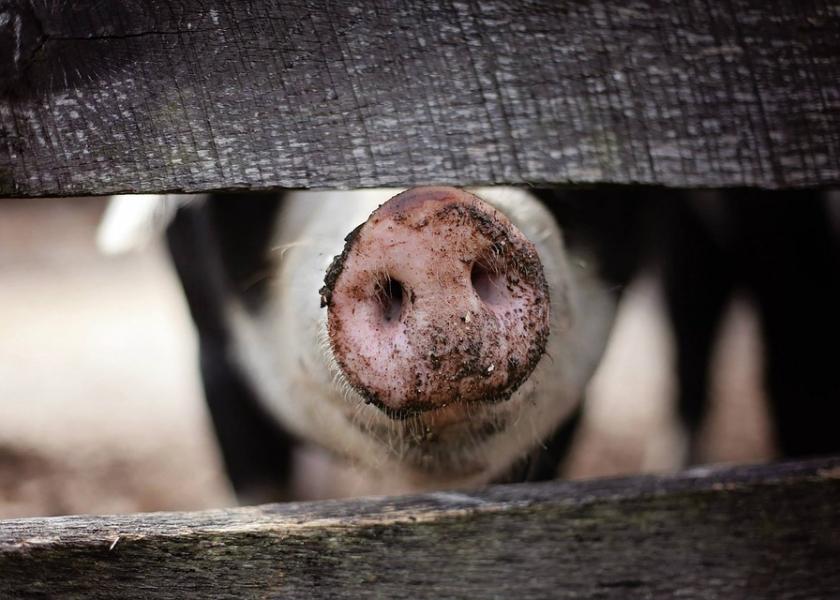African Swine Fever Research Collaborations Begin in Vietnam

A $1.7-million USDA Foreign Agricultural Service grant awarded last fall to the Swine Health Information Center (SHIC), with active support from the National Pork Producers Council (NPPC), is funding African swine fever (ASF) research that will benefit both U.S. and Vietnamese pork producers.
The grant’s overall goals include sharing veterinary knowledge and ways to prevent ASF from further spreading, while also helping to build veterinary capacity as well as strategic partnerships, and increasing trade of US pork to the region, SHIC reports.
Here’s a look at the first six ASF-related research projects underway.
1. Oral fluids as a convenient, aggregate sample for early detection of ASF.
A field evaluation of using oral fluids for detection and surveillance of ASF virus will be conducted in Vietnam. Pen-based aggregate oral (rope) fluid testing is a non-invasive, common U.S. industry practice requiring significantly lower financial and human resources than other methods, SHIC explained in a release.
Collaborators on this project are the Canadian Food Inspection Agency – National Centre for Foreign Animal Diseases, Vietnam National University of Agriculture, Iowa State University, National Bio and Agro-Defense Facility, USDA Animal Research Center and Plum Island Animal Disease Center. This project is funded by SHIC with USDA grant proceeds.
2. PCR testing and comparing available point of care technology to assess current ASF test-and-remove practices in commercial swine farms within Vietnam.
The test-and-remove protocol is based on the premise that ASF, although highly infectious, has relatively slow transmissibility, SHIC said in a release. The process involves immediate removal of any sow exhibiting clinical signs and submitting blood for ASF detection by PCR. If the animal tests positive, adjacent animals (two up and two down the trough from the sow) are also removed. This project will test sufficiency of this methodology for ASF elimination in the Vietnamese sow herd, while in the process testing four commercially available ASF point-of-care (POC) assays on diagnostic performance for detecting ASF in suspect and non-clinical neighboring animals, SHIC said.
Researchers involved in this study are from Boehringer Ingelheim, Iowa State University and Nong Lam University. This project is funded by SHIC with USDA grant proceeds.
3. Time and temperature required for complete inactivation of ASF virus.
This study will simulate the sanitation protocols currently used to disinfect animal trailers. The project’s goal is to identify the optimal baking time and temperature required to completely inactivate ASF virus in contaminated aluminum materials.
This project is conducted by the University of Nebraska and Vietnam National University of Agriculture. It’s funded by SHIC with USDA grant proceeds.
4. Rodents as potential vectors in ASF transmission.
This project explores if ASF virus can be detected in mice and rats, a potential threat of transmission. If it can be, researchers will study which tissues of mice and rats are best to sample. Next, the project will determine the impact of farm biosecurity level on rodents’ ability to carry the disease, confirming whether stringent biosecurity reduces rodent movement as compared to farms with less stringent biosecurity and older buildings. In addition, researchers will measure mouse-to-mouse transmission of ASF in a controlled, laboratory situation, determining if ASF can be transmitted between mice through direct physical contact and/or contact with feces from ASF-infected mice, SHIC explained.
Collaborators on this project are from South Dakota State University and the Vietnam National University of Agriculture. This project is funded by SHIC with USDA grant proceeds.
5. Decontamination methods for interior surfaces of transportation vehicles.
In a field investigation in Vietnam by Kansas State University, researchers indicated the cabs of vehicles responsible for feed delivery and live animal movement are a common area of ASF virus contamination. In this study, researchers will study a cab decontamination model that stimulates the air volume and surface type cab environment of a truck cab, then evaluate a series of procedures for efficacy against porcine epidemic diarrhea virus (PEDV) and ASF virus. The process will include testing in Vietnam in collaboration with Vietnamese production partners. The intended outcome is practical, efficacious and cost-effective solutions for swine producers to address the risk of contamination of cabs from numerous pathogens within a wide variety of vehicles, SHIC said.
This project is conducted by Kansas State University and is being reviewed for funding by the National Pork Board.
6. Composting process for ASF virus inactivation.
This project – validating the composting process for ASF virus inactivation – will help U.S. pork producers collect data to improve ASF outbreak response readiness and help Vietnamese pork producers better respond to and recover from ongoing ASF outbreaks. According to SHIC, the project team will conduct research in Vietnam to assess the effectiveness of swine carcass composting in inactivating the ASF virus and assess time and temperature requirements.
The University of Maine System acting through the University of Maine, along with an industry consultant, USDA APHIS staff and personnel at Vietnam National University of Agriculture in Hanoi are collaborating on this work. This project is being reviewed for funding by the National Pork Board.
"These research projects, as well as others to be contracted and announced, all share the mission of benefiting both U.S. pork producers with resources for readiness for reacting for foreign animal disease such as ASF while also providing much-needed information for Vietnamese producers already facing ASF infection,” says Paul Sundberg, DVM, SHIC executive director.
More from Farm Journal's PORK:
Is African Swine Fever Biocontainment in China Changing Management?
African Swine Fever Vaccine Candidates Show Promise, But Work Needed







